Sarah Allen's Blog, page 15
October 23, 2014
10 Things That Make Me Happy
1. This performance of this song (get ready for chills):
2. This trailer of this movie:
3. This GIF of this dog:

4. This cover of this magazine (Like really MERYL STREEPS HAIR WHAT? I can't even):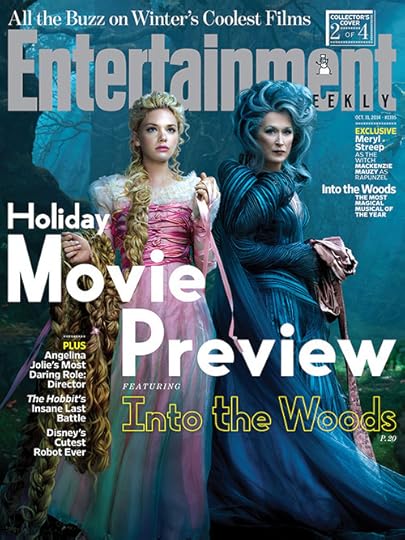
5. This illustration of this fairy-tale (by Cory Godbey):
6. This person hugging this person: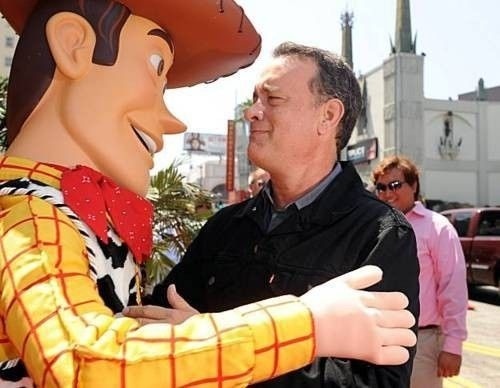
7. This kiss from this show: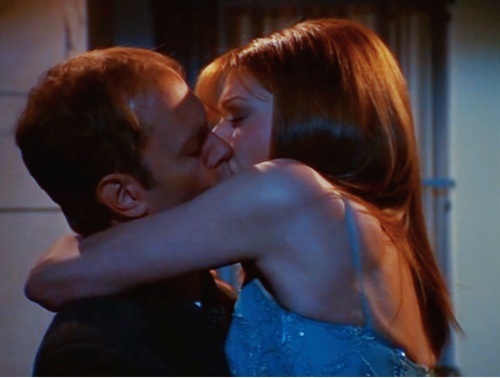 (and this one)
(and this one)
 (Okay and this one I'm a romantic okay?)
(Okay and this one I'm a romantic okay?)
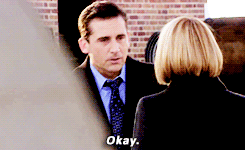
8. This tribute to these stories/characters/writers: 9. This kid in this costume:
9. This kid in this costume:
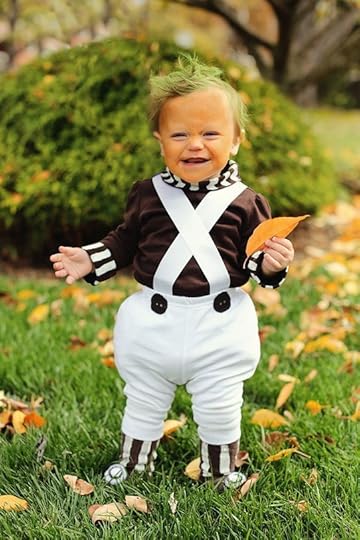
10. This man on this planet: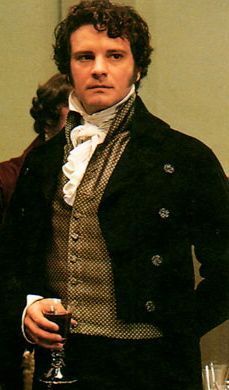
And of course YOU, you gorgeous reader you.
Have a happy filled day!
And write on!
Sarah Allen
For more updates, writing tips, and funnies, sign up for the monthly newsletter and get a free copy of 50 Marketing and Networking Tips for Writers!
2. This trailer of this movie:
3. This GIF of this dog:

4. This cover of this magazine (Like really MERYL STREEPS HAIR WHAT? I can't even):

5. This illustration of this fairy-tale (by Cory Godbey):

6. This person hugging this person:

7. This kiss from this show:
 (and this one)
(and this one)
 (Okay and this one I'm a romantic okay?)
(Okay and this one I'm a romantic okay?)

8. This tribute to these stories/characters/writers:
 9. This kid in this costume:
9. This kid in this costume:

10. This man on this planet:

And of course YOU, you gorgeous reader you.

Have a happy filled day!
And write on!
Sarah Allen
For more updates, writing tips, and funnies, sign up for the monthly newsletter and get a free copy of 50 Marketing and Networking Tips for Writers!
Published on October 23, 2014 05:00
October 20, 2014
6 Ways To Let Others Do Your Book Marketing For You
 We are writers, not marketers. Writers, not publicists. We are creating art, not peddling "product."
We are writers, not marketers. Writers, not publicists. We are creating art, not peddling "product."Writers write, right?
Cue enormous *le sigh*.
Writing, creating those beautiful words like brain babies, is absolutely our most important calling. It's top priority. But we still want people to see and read and ooh and ahh over those brain babies, and that involves what the vampires and soul-sellers of the world call "marketing," and unfortunately, in the modern publishing world, if we don't do that marketing ourselves, it's probably not going to get done. And in most cases its certainly not going to get done as effectively as we could do it ourselves.
As we writers are commanded told time and time and time again, by everyone from "authorities" to Authorities, from every conceivable platform, we modern writers are now responsible not just for creating our beautiful brain babies, but for raising them smartly and releasing them into as loving and large a throng as we can muster.
But as someone from an eight child family can tell you, isn't it enough to worry about keeping our creations alive and healthy, keeping them from lopping off their hair or blowing out their diapers, without also having to be the one that bribes all the student body to be their friend and vote for them as Homecoming Queen? Okay, so maybe I'm getting a little out of hand with my metaphors here, but you get what I mean, right?
I'm here to tell you that there are plenty of ways to be low on the sleezy and high on the lazy efficient sides of book marketing. We all know the "it takes a village" aphorism, right? Well I think it applies to book marketing too. In other words, there are lots of perfectly appropriate ways to piggy-back on other people and let them do lots of your book marketing for you.
Now, just to be clear, we are mostly talking about long-term marketing here. These are things that will be most effective months or even years before your book comes out, or in the times between books while you're just working on platform building. During the heavy-hitting book release times your probably going to be doing so much direct marketing work yourself that you'll need a year's supply of RedBull and a tribe of energizer bunnies just to get you through. These are long-term, slow building strategies, but they can really help out in the long run, and can help us be effective while still focusing our efforts on the most important thing: those brain babies.
1. Pinterest is your new best friend. When I read Anne R. Allen's post from her incomparable weekly blog I had to grin a little with the irony. I was in the middle of writing this post and in some ways we are looking at the two sides of one thing. If you haven't read Anne's post this week about the dangers and frustrations of living in our modern cyberworld, do yourself a favor and check it out. All the points she brings up are vitally important and need to be kept at the forefront of our online strategies. As we said at camp, "Safety first!"
That being said, Pinterest can be one of your most useful tools when used correctly. The many social media options and "must-do's" out there can be completely overwhelming, but before you get scared off, let me explain about Pinterest. One of the dangers of adding to your social media platform is the time-suck, and people are afraid of that with Pinterest especially. But honestly, give it a chance and Pinterest can be one of the least intimidating and least involved platforms out there. It can absolutely be a black hole of where-did-the-last-seven-hours-go if you want it to be let it, but it by no means has to be. Being an active user of Pinterest can mean no more than five minutes a day of looking at and maybe repinning pictures of motivational writing quotes, beautiful book covers, great blog posts, and pictures of Benedict Cumberbatch. Honestly. That's all it requires.
And did you catch that thing I just said about blog posts? I get more traffic to this blog from Pinterest than almost any other site. The way Pinterest is structured, it is easier to get discovered and spread on this site than any other, at least in my experience. What I do is make images almost like book covers for a blog post, using an applicable and appropriate photo. (Like the one at the top of this post). I edit and text overlay using a photo-editing site like PicMonkey. Don't let that scare you off either. It may be a learning curve but you'll end up being able to whip one up in less than five minutes. And then put it up on Pinterest, and bam, you have other people spreading your word. I am by no means an expert, but for an example of how I've been using Pinterest at least relatively successfully, check out my Pinterest boards, especially the ones for writers. (Whew, I didn't realize I had so much to say about this site. Maybe it deserves it's own how-to style post...)
2. Take advantage of the @Mention. The @mention feature on Twitter is one of your best tools for doing some totally appropriate piggy-backing of other people's audience. On Twitter itself, when you communicate directly with people in your industry using the @mention, you increase your chances of getting your tweet favorited or retweeted, thereby being introduced to the other tweeters audience. I.e., letting them do some of the work for you.
But the @mention can help in even more ways. I've had tweets mentioned in other author's newsletters that led people to both my twitter account and this blog. And you know how I make a spotlight list of other blog posts every week? I make sure to mention those bloggers on Twitter too. Of course doing this expecting other people to owe you any favors is totally obnoxious, (and this tool is mean to be the opposite of harassment) but I've been lucky enough to have my post mentioned or retweeted on other authors blogs and that has led to some great traffic that another writer already had ready and waiting. Plus its just a great way to be involved, and involving yourself with others creates involvement for you.
3. Guest post. "Wait!" I hear some of you saying. "You said this was for lazy marketers and writing more blog posts isn't lazy-friendly at all!"
True, but think of it in terms of return on investment. Letting other people do your book marketing for you is all about efficiency. Yes, you have to spend an additional 3-4 hours crafting the guest post. But if you put in the effort, do your best work, and are lucky enough to get accepted by some of the huge platform blogs, then guess what that means? That means you spent 3-4 hours reaching a crazy large audience that it would have taken you hundreds and hundreds of hours to reach otherwise. That blogger has already put in those hundreds, even thousands of hours building up that great audience, and guest blogging is the perfect way for you to piggy-back. In an appropriate, non-creepy (hopefully) way that is beneficial to both parties.
4. Create or discover interview opportunities. Again, this can take less effort than you expect. And it's all about efficiency and return on investment, right? The good thing is that there are already some tools in place that make this strategy quite simple. Help A Reporter Out is a newsletter sent directly to your inbox every day that lists topics reporters from everywhere want to get quotes about. For example, perhaps a newspaper reporter in Milwaukee needs to interview three middle school librarians, or a blogger for a major corporation wants to talk to work from home moms. Stuff like that. I've found a couple applicable postings, and if I can, you definitely can. And there's no easier way to piggy-back on that publication's audience.
The other tool is Blog Talk Radio. Caveat: I haven't used this site yet, but I've heard a lot about it lately and plan to get started soon. What I know so far is that this is a platform for anyone to create their own radio show or podcast, and some have audiences in the thousands. If anyone has any experience using this site I'd love to hear about it.
5. Blurb, collaborate, and bundle with other authors. How do you get your name and the title of your book on the cover of someone else's book? Blurbs! If you get a chance and it seems appropriate, blurbing might be a good opportunity.
And collaborating. Writing a book with another author is an automatic introduction to their already-built audience. However it doesn't even have to be as involved as all that, because I know writing a book with someone else isn't for everyone. But what about anthologies? That's collaboration, right? Or co-authored blogs? Or working with an illustrator to create a picture book or illustrated poetry? All great collaborative opportunities that mean access to someone elses in-place audience. Efficiency in book marketing is all about getting access to these already-built audiences. A reader who buys an anthology because they know another writer might end up loving your work just as much. And all you had to do was write.
And don't forget bundles. I've never done one myself, but selling your work in a bundle with some other authors gives you basically the same advantages of an anthology, but may have an even wider reach.
6. Ask. You know who else probably has a built-in audience? Your family and friends. Maybe they don't have the reach of some of the big industry influencers, but they can still help. Again, I have to emphasize, my point here is the opposite of "be entitled and pushy." In fact as a general online rule you should be giving help as much if not much more than you're asking for it. But you also shouldn't be afraid of asking for help when its appropriate. Asking your friends and family for a boost on their Facebook and Twitter pages, especially when your book is nearing release, can be a big help in your push to get the ball rolling. And most likely you'll have plenty of people who are more than happy to help.
So. There are ways that we can appropriately piggy-back on other people's audience and let them do some of our book marketing for us. Keep in mind that this is about being pro-actively efficient and smart, and is absolutely not about being entitled or sleazy or pushy. Have I said that enough? Also keep in mind that many of these strategies are long-term and slow-building; more about building our blog readership and growing our email list than direct sales. But if we use these strategies effectively then when its time for our precious brain baby to be released into the world, we already have a bit of a network in place and ready to go.
Do you think these strategies can help? What other ideas do you have for piggy-backing on other peoples audience and letting them do some of our book marketing for us?
Write (and minimally market) on!
Sarah Allen
This Week On Social Media:
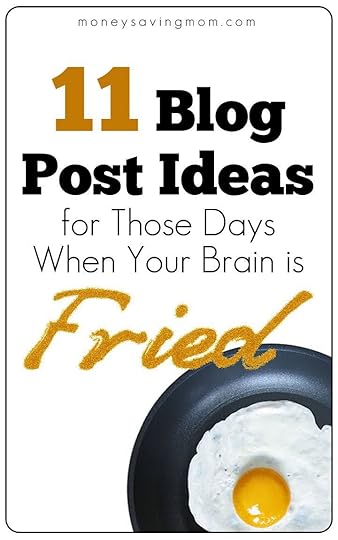
For more frequent updates, writing tips, and funnies, follow on Facebook, Twitter, Google+,
YouTube, Pinterest, Tumblr, GoodReads, and/or Instagram.
SUBMISSION OPPORTUNITIES:
First Line Magazine: Submit a story with the assigned first line. Due Nov. 1.Critical Pass Review: Calling all poets, writers, photographers, and visual artists! The Critical Pass Review is now accepting submissions for its Fall 2014 Issue. Due Nov. 19.Madcap Review: There are two weeks left to submit to Madcap Review! Due Oct. 31.Imitation & Illusion: For I&A 2.2, we're looking for submissions that combine the styles of poet Jillian Weise and sci-fi writer James Blish. Each author uniquely approaches a specific subset of the science fiction genre, broaching the subjects of biology, self-awareness, and society. Due Nov. 21.Big Book of Useful Poetry: Submit "useful" poems as well as the tags for their usefulness. Tag examples: . Poems can be previously published as long as you have the rights for reprints. No limericks. Submit up to three poems. Until Filled.
SPOTLIGHT: How To Get A Platform Like A Reality Star (Author Culture) 10 Resources for Writers and Bloggers (Nina Badzin) How To Get Traffic To Your Author Website (Your Writer Platform) You're More Influential Than You Think (Novel Rocket)
Published on October 20, 2014 04:00
October 16, 2014
To Hold A Killer In Your Hand
There are lots of cool things about Las Vegas.
One of the coolest has to be the Clark County Renaissance Festival.
I'd never been to a Ren Faire before this weekend (I know, I know, it's like I need to turn in my nerd card or something) but that oversight has been fixed. I wasn't quite sure what to expect, but boy, I wasn't disappointed.
As some of the people I chatted with beforehand mentioned, the people watching was often the coolest part. The costumes and decorations and food and everything were just incredible.
Also camels.
 (I swear its the Geico Hump Day camel. He's making that face...)
(I swear its the Geico Hump Day camel. He's making that face...)
So, there's this thing, both online and IRL, where I sometimes wonder if I'm being taken seriously. Not you guys, you guys are great. And it's not ever anything even remotely big deal-ish. But, ya know, I get called darling and sweetheart a lot, and every once in a while I'll catch a surprised look on someone's face when they see that I can, like, do things. I'm pretty sure this all just comes with the short, round-faced blond territory. Which, again, is totes fine most the time, but I do wonder sometimes if I look young enough even just in profile pictures and such that it influences my online and IRL interactions with serious, important people like agents and editors.
But I think, at the Renaissance Fair, I came up with a solution.
First, I need to take lessons from this guy:

That is real life full metal armor and there was real life jousting with real life lances that shattered on impact and everything. It was completely epic. This guy is a former soldier and started the Knights of Mayhem for the pure love of jousting. There's not a single agent or editor or book buyer alive who would not take this guy seriously.

Am I right? This guy was so epic I had to play with Photoshop to capture his true awesometacity.
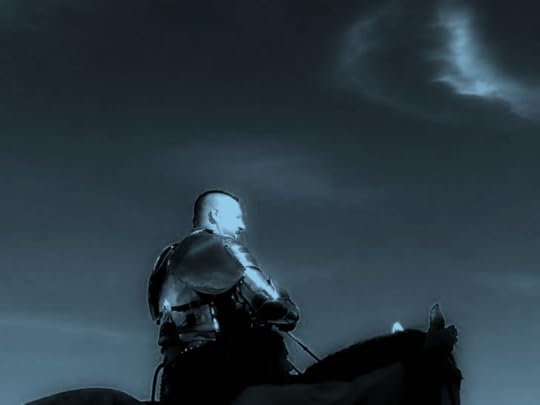
(Is there female jousting? Is that a thing?)
Mostly, though, I just need to make sure that in all my profile pictures, I've got a killer in my hand.
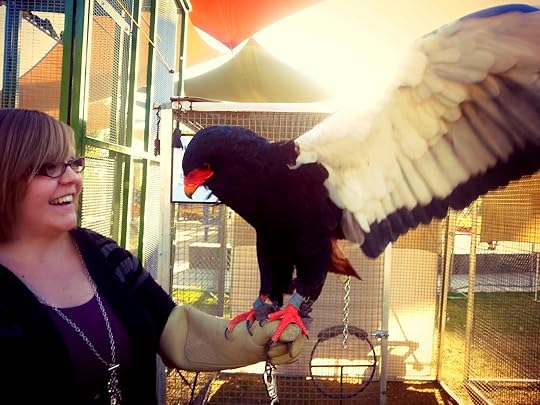
Isn't she gorgeous? The trainer said her name is Sheba, and she's a Bateleur Eagle. I mean it just keeps building epic upon epic. Sheba? Bateleur? And look at that wing span!
To be honest, though, I'm not sure that picture is going to help me out very much, because even with a killer in my hand I still look younger than I am, and I still have a goofy grin on my face. Although, the trainer did compliment my endurance and tight grip (I'm also stronger than I look :v). And you know what, I'm thinking maybe that's okay, because all it means is that I just need to find people who take goofy grins and round faces and Pixar and Mo Willems and Gary Larson and Frasier and puns and Aslan and Atticus and the Newberry Award and chocolate covered bananas as seriously as I do. And, of course, there are lots of us out there, which is why the blogosphere is so amazing, because I get to talk with lots of you all the time!
So yeah, let's just acknowledge that the best life is one where you have a Bateleur Eagle or a lance in one hand, and a blue-ray DVD of Monsters, Inc., or the complete collection of Calvin and Hobbes, or a Mickey Mouse hat in the other.
And with whatever hand you've got left (whether you were born with it or stole it from the church cemetary across the street, I won't judge)...
Write on!
Sarah Allen
For more updates, writing tips, and funnies, sign up for the monthly newsletter and get a free copy of 50 Marketing and Networking Tips for Writers!
One of the coolest has to be the Clark County Renaissance Festival.
I'd never been to a Ren Faire before this weekend (I know, I know, it's like I need to turn in my nerd card or something) but that oversight has been fixed. I wasn't quite sure what to expect, but boy, I wasn't disappointed.
As some of the people I chatted with beforehand mentioned, the people watching was often the coolest part. The costumes and decorations and food and everything were just incredible.
Also camels.
 (I swear its the Geico Hump Day camel. He's making that face...)
(I swear its the Geico Hump Day camel. He's making that face...)So, there's this thing, both online and IRL, where I sometimes wonder if I'm being taken seriously. Not you guys, you guys are great. And it's not ever anything even remotely big deal-ish. But, ya know, I get called darling and sweetheart a lot, and every once in a while I'll catch a surprised look on someone's face when they see that I can, like, do things. I'm pretty sure this all just comes with the short, round-faced blond territory. Which, again, is totes fine most the time, but I do wonder sometimes if I look young enough even just in profile pictures and such that it influences my online and IRL interactions with serious, important people like agents and editors.
But I think, at the Renaissance Fair, I came up with a solution.
First, I need to take lessons from this guy:

That is real life full metal armor and there was real life jousting with real life lances that shattered on impact and everything. It was completely epic. This guy is a former soldier and started the Knights of Mayhem for the pure love of jousting. There's not a single agent or editor or book buyer alive who would not take this guy seriously.

Am I right? This guy was so epic I had to play with Photoshop to capture his true awesometacity.

(Is there female jousting? Is that a thing?)
Mostly, though, I just need to make sure that in all my profile pictures, I've got a killer in my hand.

Isn't she gorgeous? The trainer said her name is Sheba, and she's a Bateleur Eagle. I mean it just keeps building epic upon epic. Sheba? Bateleur? And look at that wing span!
To be honest, though, I'm not sure that picture is going to help me out very much, because even with a killer in my hand I still look younger than I am, and I still have a goofy grin on my face. Although, the trainer did compliment my endurance and tight grip (I'm also stronger than I look :v). And you know what, I'm thinking maybe that's okay, because all it means is that I just need to find people who take goofy grins and round faces and Pixar and Mo Willems and Gary Larson and Frasier and puns and Aslan and Atticus and the Newberry Award and chocolate covered bananas as seriously as I do. And, of course, there are lots of us out there, which is why the blogosphere is so amazing, because I get to talk with lots of you all the time!
So yeah, let's just acknowledge that the best life is one where you have a Bateleur Eagle or a lance in one hand, and a blue-ray DVD of Monsters, Inc., or the complete collection of Calvin and Hobbes, or a Mickey Mouse hat in the other.
And with whatever hand you've got left (whether you were born with it or stole it from the church cemetary across the street, I won't judge)...
Write on!
Sarah Allen
For more updates, writing tips, and funnies, sign up for the monthly newsletter and get a free copy of 50 Marketing and Networking Tips for Writers!
Published on October 16, 2014 04:00
October 13, 2014
5 Traits of Seriously Despicable Villains
There is a whole spectrum of antagonists and characters who are just awful people. There's the cackling, hand-wringing villain, the sweet but deadly villain, the shy misunderstood villain, and even villains who probably more like anti-heroes (*ahem* Snape *ahem*). These types of characters are kind of fun to watch. We like to see them be witty and snarky or finally show their true inner feelings.
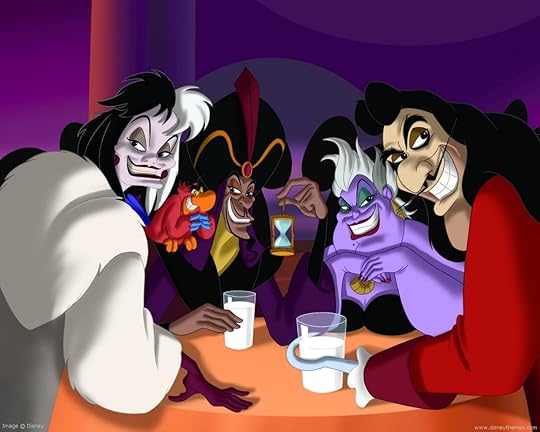
But there's a difference between characters we love to hate, and characters we just point-blank hate. Period.
I'm talking about the latter kind of character. I'm talking about characters who are honestly no fun at all, who make our skin crawl, who can even make us sick to our stomach. Because sometimes those are the characters our protagonists are going up against. I can think of quite a few characters who are rude, dishonest, even petty, who people still end up rooting for. So what is that makes a character truly despicable?
To be honest, I'm not very naturally good at writing villains, which is why I've been thinking about this lately. When I try to write out and out villains I typically end up liking them too much, and then they turn out more like anti-heroes than real villains. So I've been thinking of villains that I consider truly horrific, and trying to see what traits those characters have that make them so utterly loathsome. Here are some I've come up with.
1. Misogyny and Racism. The second a character in a book or show evinces an inkling of misogyny or racism, they loose all credibility. That is the instant I stop being able to take them seriously in any way. Everything they say from that point on becomes pure bunk. And if a character is so unsympathetic you don't even consider them worth your notice, I think that's a successfully unsympathetic character.
2. Mistreatment of Subordinates. This is a big one. You know the classic screenwriting book, Save the Cat? Well, the title of that book comes from a type of scene that typically comes early on in the movie. It's either a "save the cat" scene or a "kick the cat" scene. If a character seems aloof, rude, or otherwise unlikable, but then comes across a stuck cat and tries to help, we start seeing the possibility of redemption for that character. On the other hand, if a character seems pleasant and charming but, when left alone, starts kicking cats, we as an audience feel we've seen the characters true and contemptible nature. "Kicking the cat" comes in many forms, whether its manipulation, physical violence, or something else. But if you want a villain your readers truly hate, a character who mistreats those with less power is a good way to go.

3. Lack of Remorse. In my opinion, one of the most successful villains ever written is Wild Bill from Stephen King's The Green Mile. (Trust Stephen King to come up with the great villains. And Sam Rockwell's brilliant portrayal in the film adaptation doesn't hurt either.) One of the things that makes Wild Bill so gut-wrenchingly awful is that he is not only outright racist, he not only assaulted two little girls, but he thinks its funny. He spends his time laughing and shouting awful things to the guards and other inmates, and only takes things seriously long enough to be let out of the straight jacket before he's back at it again. If we sense true repentance in a character, I think we can forgive them nearly anything. But lack of remorse equals lack of sympathy.
4. Sense of Entitlement. In almost any crime show, every few episodes you'll come across a criminal who's committing crimes at least in part because they feel they are above the law. They feel that they are above the "common crowd." They are special. This sense of entitlement is particularly awful when combined with abuse of those less powerful. In low doses this basically just makes readers roll their eyes, but taken to extremes can make your audience want to pull the dang rug out from under this idiot in as dramatic and violent a way as possible.
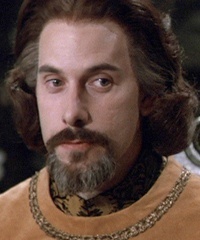
5. Sadism. This one can really get your skin to crawl. And it's one of the reasons I had to stop watching Criminal Minds, because they did this so strongly in a lot of their villains. But let's take a lighter example, like Princess Bride. Prince Humperdink's manipulation of his subordinate (Princess Buttercup) is totally creepy, but equally creepy is the way Count Rugen's eyes get wide with pleasure as he's torturing Wesley in the Pits of Dispair. (Don't even think about trying to escape. Also I still can't believe that's Christopher Guest). Adding that layer of liking the terrible things they're doing to other people really ups the readers disgust.
Now it's your turn. Which are your favorite examples of truly despicable villains? Are there more traits we should add to this list?
Write on!
Sarah Allen
This Week on Social Media:
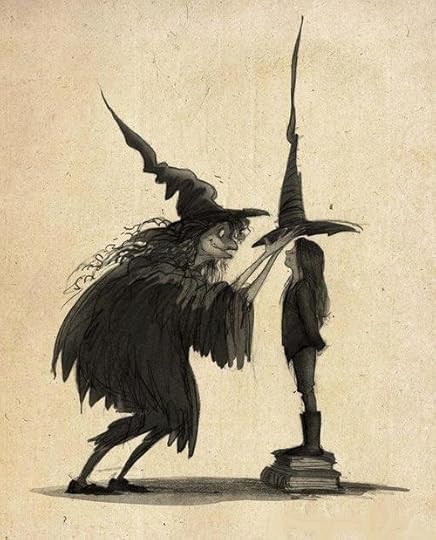
For more frequent updates, writing tips, and funnies, follow on Facebook, Twitter, Google+,
YouTube, Pinterest, Tumblr, GoodReads, and/or Instagram.
SUBMISSION OPPORTUNITIES:
Cicada Magazine: Cicada YA lit/comics magazine seeks submissions for an upcoming issue on Tricksters and Thieves. We’re on the lookout for tales of pirates, con artists, and trickster gods; explorations of glamour, enchantment, sleight of hand, and other crafts of illusion; and investigations of the slipperiness of the authentic self in a world of performances. We’re also interested in forms of creative appropriation: translation, fan fiction, retold tales, found art and poetry. Due Oct. 31.Coe Review Magazine: Coe Review, established in 1971 and run by an entirely undergraduate editorial staff, wants to read your poetry and fiction. From our hundreds of submissions, we choose those with refreshing perspectives, forms, styles, and messages. Due Oct. 25.Damselfly Press: damselfly press seeks to promote exceptional writing by women. We welcome work from female writers of all experiences. If you’d like to submit, please first visit our guidelines section before emailing your submission. Rolling Submissions.Storm Cellar Magazine: Storm Cellar, a literary journal of safety and danger, seeks amazing fiction, poetry, creative nonfiction, and flash. We welcome visual art in any medium. Midwesterners and women are encouraged; we're listening for diverse voices. Rolling Submissions.
SPOTLIGHT: 19 Websites and Magazines That Want To Publish Your Personal Essays (The Write Life) Its Not Too Late To Achieve Your Writing Goal for 2014 (Plot Whisperer) How To Stop Wasting Time And Focus Your Book Marketing (Social Media Just For Writers) How To Read Your Own Audiobook and Sell Direct To Customers (The Creative Penn) The Most Overlooked Piece of Real Estate On Your Blog (Goins, Writer)

But there's a difference between characters we love to hate, and characters we just point-blank hate. Period.
I'm talking about the latter kind of character. I'm talking about characters who are honestly no fun at all, who make our skin crawl, who can even make us sick to our stomach. Because sometimes those are the characters our protagonists are going up against. I can think of quite a few characters who are rude, dishonest, even petty, who people still end up rooting for. So what is that makes a character truly despicable?
To be honest, I'm not very naturally good at writing villains, which is why I've been thinking about this lately. When I try to write out and out villains I typically end up liking them too much, and then they turn out more like anti-heroes than real villains. So I've been thinking of villains that I consider truly horrific, and trying to see what traits those characters have that make them so utterly loathsome. Here are some I've come up with.
1. Misogyny and Racism. The second a character in a book or show evinces an inkling of misogyny or racism, they loose all credibility. That is the instant I stop being able to take them seriously in any way. Everything they say from that point on becomes pure bunk. And if a character is so unsympathetic you don't even consider them worth your notice, I think that's a successfully unsympathetic character.
2. Mistreatment of Subordinates. This is a big one. You know the classic screenwriting book, Save the Cat? Well, the title of that book comes from a type of scene that typically comes early on in the movie. It's either a "save the cat" scene or a "kick the cat" scene. If a character seems aloof, rude, or otherwise unlikable, but then comes across a stuck cat and tries to help, we start seeing the possibility of redemption for that character. On the other hand, if a character seems pleasant and charming but, when left alone, starts kicking cats, we as an audience feel we've seen the characters true and contemptible nature. "Kicking the cat" comes in many forms, whether its manipulation, physical violence, or something else. But if you want a villain your readers truly hate, a character who mistreats those with less power is a good way to go.

3. Lack of Remorse. In my opinion, one of the most successful villains ever written is Wild Bill from Stephen King's The Green Mile. (Trust Stephen King to come up with the great villains. And Sam Rockwell's brilliant portrayal in the film adaptation doesn't hurt either.) One of the things that makes Wild Bill so gut-wrenchingly awful is that he is not only outright racist, he not only assaulted two little girls, but he thinks its funny. He spends his time laughing and shouting awful things to the guards and other inmates, and only takes things seriously long enough to be let out of the straight jacket before he's back at it again. If we sense true repentance in a character, I think we can forgive them nearly anything. But lack of remorse equals lack of sympathy.
4. Sense of Entitlement. In almost any crime show, every few episodes you'll come across a criminal who's committing crimes at least in part because they feel they are above the law. They feel that they are above the "common crowd." They are special. This sense of entitlement is particularly awful when combined with abuse of those less powerful. In low doses this basically just makes readers roll their eyes, but taken to extremes can make your audience want to pull the dang rug out from under this idiot in as dramatic and violent a way as possible.

5. Sadism. This one can really get your skin to crawl. And it's one of the reasons I had to stop watching Criminal Minds, because they did this so strongly in a lot of their villains. But let's take a lighter example, like Princess Bride. Prince Humperdink's manipulation of his subordinate (Princess Buttercup) is totally creepy, but equally creepy is the way Count Rugen's eyes get wide with pleasure as he's torturing Wesley in the Pits of Dispair. (Don't even think about trying to escape. Also I still can't believe that's Christopher Guest). Adding that layer of liking the terrible things they're doing to other people really ups the readers disgust.
Now it's your turn. Which are your favorite examples of truly despicable villains? Are there more traits we should add to this list?
Write on!
Sarah Allen
This Week on Social Media:

For more frequent updates, writing tips, and funnies, follow on Facebook, Twitter, Google+,
YouTube, Pinterest, Tumblr, GoodReads, and/or Instagram.
SUBMISSION OPPORTUNITIES:
Cicada Magazine: Cicada YA lit/comics magazine seeks submissions for an upcoming issue on Tricksters and Thieves. We’re on the lookout for tales of pirates, con artists, and trickster gods; explorations of glamour, enchantment, sleight of hand, and other crafts of illusion; and investigations of the slipperiness of the authentic self in a world of performances. We’re also interested in forms of creative appropriation: translation, fan fiction, retold tales, found art and poetry. Due Oct. 31.Coe Review Magazine: Coe Review, established in 1971 and run by an entirely undergraduate editorial staff, wants to read your poetry and fiction. From our hundreds of submissions, we choose those with refreshing perspectives, forms, styles, and messages. Due Oct. 25.Damselfly Press: damselfly press seeks to promote exceptional writing by women. We welcome work from female writers of all experiences. If you’d like to submit, please first visit our guidelines section before emailing your submission. Rolling Submissions.Storm Cellar Magazine: Storm Cellar, a literary journal of safety and danger, seeks amazing fiction, poetry, creative nonfiction, and flash. We welcome visual art in any medium. Midwesterners and women are encouraged; we're listening for diverse voices. Rolling Submissions.
SPOTLIGHT: 19 Websites and Magazines That Want To Publish Your Personal Essays (The Write Life) Its Not Too Late To Achieve Your Writing Goal for 2014 (Plot Whisperer) How To Stop Wasting Time And Focus Your Book Marketing (Social Media Just For Writers) How To Read Your Own Audiobook and Sell Direct To Customers (The Creative Penn) The Most Overlooked Piece of Real Estate On Your Blog (Goins, Writer)
Published on October 13, 2014 04:00
October 9, 2014
The Metal Creatures That Live In The Desert
 I live in the desert, and this last weekend, I got to visit more of it. I often take the opportunity to visit my grandparents and other extended family in St. George, Utah, during LDS General Conference weekend. It's a great opportunity to just basically do something different.
I live in the desert, and this last weekend, I got to visit more of it. I often take the opportunity to visit my grandparents and other extended family in St. George, Utah, during LDS General Conference weekend. It's a great opportunity to just basically do something different.On this trip, my grandma and I went exploring up Zion's canyon and stopped at some of the delightful shops along the way. We got some delicious bumbleberry icecream, took pictures of the beautiful red rock, and of course, discovered the delightful metal creatures that live in the desert.

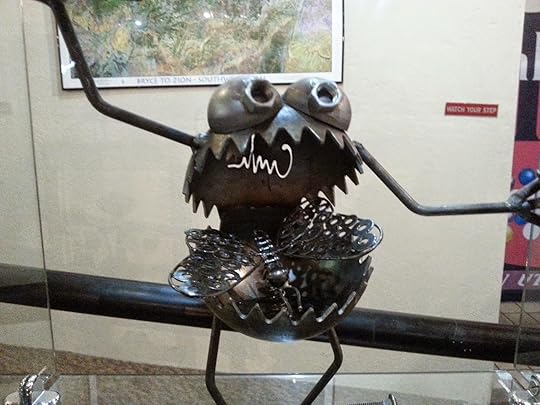
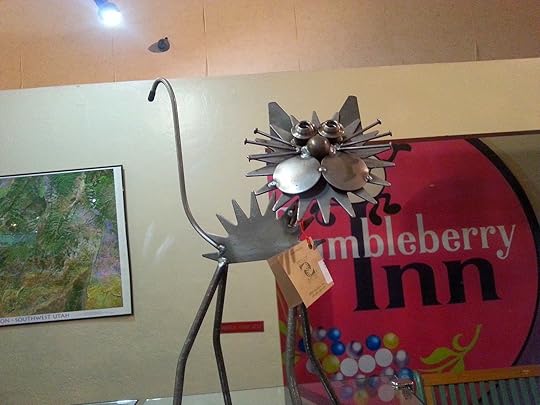

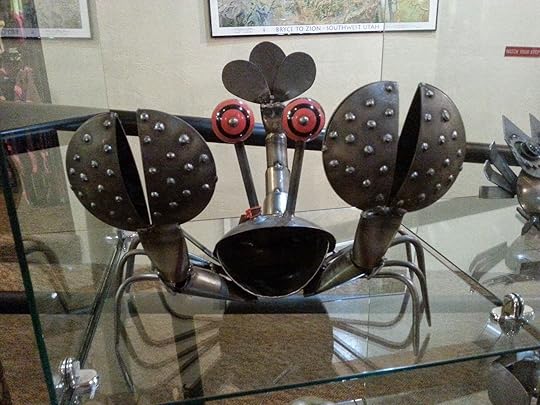
We've got our metal owl, metal lion, metal lobster, metal kitty cat, and that delightful robotic frog with a metal fly caught in its trap. Some good fun.
I really admire those with these types of artisan skills. I think it requires a tremendous amount of patience...something I don't have. But whatever it is that you create--whether it's a metal lobster, a spinach salad, or a smile on someone else's face--remember that you have taken disorder and made something beautiful, which means the world is a more beautiful place because you're in it.
And because there are metal lions and owls and lobsters.
Write on!
Sarah Allen
For more updates, writing tips, and funnies, sign up for the monthly newsletter and get a free copy of 50 Marketing and Networking Tips for Writers!
Published on October 09, 2014 04:00
October 6, 2014
The Best Thing About Speculative Fiction
I think as writers we get a lot of our themes and style from our parents, or at least the way we were raised. But I have a confession to make.
My mom didn't love Harry Potter.
I know. This is one area where we differ. My mom was much more a fan of books like The Secret Life of Bees, or The Glass Castle. She prefers stuff like memoir.
Now, I don't particularly love memoir, but I love the gritty realism type of thing that she loves. As a child she gave me books like Summer of the Monkeys and A Long Way From Chicago. which I absolutely loved. Some of our favorite movies of recent years are Dan In Real Life and The Way, Way Back. Such incredible movies.
Now enter my roommates. When I went to college I got introduced to a plethora of things I probably wouldn't have been introduced to otherwise, and for which I'm very grateful. Things like Dr. Who and Firefly and Star Trek. Stuff I also absolutely, thoroughly love.
And my roommates basically all hated Dan In Real Life.
Which seemed to suggest that these genres are polar opposites, but I'm starting to see how that is false. I'm starting to see how genre is more of a venn diagram, and it's the overlapping area between these two categories that most intrigues me.
One of my favorite books that perfectly exemplifies this overlap area is The Green Mile by Stephen King. It's set on death row in the Depression era. You don't get more gritty realism then that. And the book deals in large part with hard themes like racism. But then you get this sort of mystical element--a gigantic black man with healing powers. The guards various reactions to this discovery are absolutely fascinating. The main character's faith in general is tested, then strengthened, and he has to make some tough and hard choices about what to do. He does his best, and is open to learning and change through his relationship with this man. Another guard is so manipulative, prissy, and crazy that he can't remotely be trusted with the secret.
In other words, this story enables us to explore humanity, at its best, worst, and most complex, in ways we could not have without that little bit of magic. Speculative fiction enables us to explore what it is to be human by testing us in superhuman scenarios.
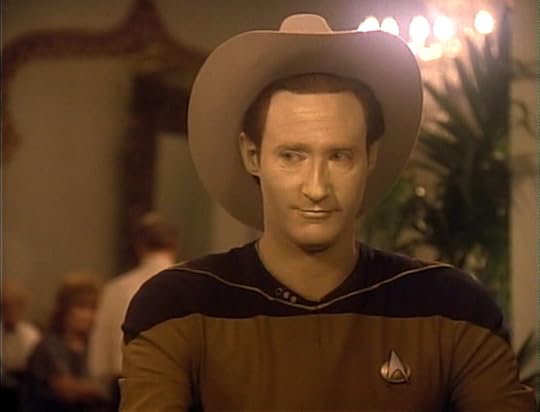
One of my favorite episodes of Star Trek is in the first few seasons of TNG. Data is put on trial to determine if an android has the freedom to refuse tests, or make their own choices. In other words, if he is to be granted the same rights as his human (well, organic might be a more appropriate term) shipmates. Picard is charged with defending Data, and his final statements give me shivers just thinking about it. The entire episode is about how it is our treatment of subordinates and those less powerful or different that says the most about who we are as humans.
And they couldn't have framed that as dramatically and starkly as they did without an android in the defendants seat.
It is often said that one can explain a thing best by explaining what it is not, and perhaps speculative fiction is what gives us the opportunity to do that with humanity. It's a hobbit's stubbornness, a dwarf's sense of pride, these familiar characteristics that resonate with us, and frame this human qualities in fresh, interesting, and memorable ways.
Of course all genres have value, and serve their own legitimate purpose. But for myself as a writer, it's this overlap area that really intrigues me. I very rarely write hard core sci-fi or fantasy, but I also have a hard time writing anything without some element of the weird and supernatural.
What about you? What is your favorite part about speculate fiction, or the genre that you write?
Write on!
Sarah Allen
This Week on Social Media:
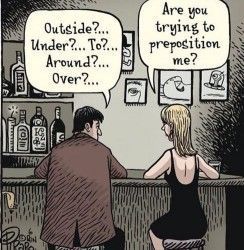
For more frequent updates, writing tips, and funnies, follow on Facebook, Twitter, Google+,
YouTube, Pinterest, Tumblr, GoodReads, and/or Instagram.
SUBMISSION OPPORTUNITIES:
Writers Digest: Your Story 61: Write the opening sentence (just one, of 25 words or fewer) to a story based on a photo given. You can be funny, poignant, witty, etc.; it is, after all, your story. Due Oct. 13.Black Balloon Publishing: A prize of $5,000 and publication by Black Balloon Publishing will be given annually for a short story collection or a novel. The editors will judge. Submit an unpublished manuscript of at least 50,000 words during the month of October. There is no entry fee. Due Oct. 31.Drafthorse Online Publication: drafthorse is a biannual online publication of fiction, creative nonfiction, poetry, visual narrative, and other media art where work, occupation, labor—or lack of the same—is in some way intrinsic to a narrative’s potential for epiphany. Due Oct. 31.Tavern Books Wrolstad Contemporary Poetry Series: Tavern Books seeks submissions of new, full-length poetry manuscripts for the Wrolstad Contemporary Poetry Series. Open to all female poets 40 years of age and younger who are US citizens, regardless of publication history. Selected author receives a $1,000 book sales advance, paperback and hardcover publication in the Tavern Books catalog, national distribution, and a close working relationship with the editorial staff. Due Jan. 15.
SPOTLIGHTS:8 Fundamental Steps to Being a Professional Author (storyfix) 3 Reasons YOU Are The Most Important Selling Point For Your Book (K.M. Weiland) 29 Fantastic Writing Conferences (TheWriteLife) 3 Steps To Start A Daily Writing Habit (Goins, Writer) Tough Love Talk For Writers (Chuck Wendig)
My mom didn't love Harry Potter.
I know. This is one area where we differ. My mom was much more a fan of books like The Secret Life of Bees, or The Glass Castle. She prefers stuff like memoir.
Now, I don't particularly love memoir, but I love the gritty realism type of thing that she loves. As a child she gave me books like Summer of the Monkeys and A Long Way From Chicago. which I absolutely loved. Some of our favorite movies of recent years are Dan In Real Life and The Way, Way Back. Such incredible movies.
Now enter my roommates. When I went to college I got introduced to a plethora of things I probably wouldn't have been introduced to otherwise, and for which I'm very grateful. Things like Dr. Who and Firefly and Star Trek. Stuff I also absolutely, thoroughly love.
And my roommates basically all hated Dan In Real Life.
Which seemed to suggest that these genres are polar opposites, but I'm starting to see how that is false. I'm starting to see how genre is more of a venn diagram, and it's the overlapping area between these two categories that most intrigues me.
One of my favorite books that perfectly exemplifies this overlap area is The Green Mile by Stephen King. It's set on death row in the Depression era. You don't get more gritty realism then that. And the book deals in large part with hard themes like racism. But then you get this sort of mystical element--a gigantic black man with healing powers. The guards various reactions to this discovery are absolutely fascinating. The main character's faith in general is tested, then strengthened, and he has to make some tough and hard choices about what to do. He does his best, and is open to learning and change through his relationship with this man. Another guard is so manipulative, prissy, and crazy that he can't remotely be trusted with the secret.
In other words, this story enables us to explore humanity, at its best, worst, and most complex, in ways we could not have without that little bit of magic. Speculative fiction enables us to explore what it is to be human by testing us in superhuman scenarios.

One of my favorite episodes of Star Trek is in the first few seasons of TNG. Data is put on trial to determine if an android has the freedom to refuse tests, or make their own choices. In other words, if he is to be granted the same rights as his human (well, organic might be a more appropriate term) shipmates. Picard is charged with defending Data, and his final statements give me shivers just thinking about it. The entire episode is about how it is our treatment of subordinates and those less powerful or different that says the most about who we are as humans.
And they couldn't have framed that as dramatically and starkly as they did without an android in the defendants seat.
It is often said that one can explain a thing best by explaining what it is not, and perhaps speculative fiction is what gives us the opportunity to do that with humanity. It's a hobbit's stubbornness, a dwarf's sense of pride, these familiar characteristics that resonate with us, and frame this human qualities in fresh, interesting, and memorable ways.
Of course all genres have value, and serve their own legitimate purpose. But for myself as a writer, it's this overlap area that really intrigues me. I very rarely write hard core sci-fi or fantasy, but I also have a hard time writing anything without some element of the weird and supernatural.
What about you? What is your favorite part about speculate fiction, or the genre that you write?
Write on!
Sarah Allen
This Week on Social Media:

For more frequent updates, writing tips, and funnies, follow on Facebook, Twitter, Google+,
YouTube, Pinterest, Tumblr, GoodReads, and/or Instagram.
SUBMISSION OPPORTUNITIES:
Writers Digest: Your Story 61: Write the opening sentence (just one, of 25 words or fewer) to a story based on a photo given. You can be funny, poignant, witty, etc.; it is, after all, your story. Due Oct. 13.Black Balloon Publishing: A prize of $5,000 and publication by Black Balloon Publishing will be given annually for a short story collection or a novel. The editors will judge. Submit an unpublished manuscript of at least 50,000 words during the month of October. There is no entry fee. Due Oct. 31.Drafthorse Online Publication: drafthorse is a biannual online publication of fiction, creative nonfiction, poetry, visual narrative, and other media art where work, occupation, labor—or lack of the same—is in some way intrinsic to a narrative’s potential for epiphany. Due Oct. 31.Tavern Books Wrolstad Contemporary Poetry Series: Tavern Books seeks submissions of new, full-length poetry manuscripts for the Wrolstad Contemporary Poetry Series. Open to all female poets 40 years of age and younger who are US citizens, regardless of publication history. Selected author receives a $1,000 book sales advance, paperback and hardcover publication in the Tavern Books catalog, national distribution, and a close working relationship with the editorial staff. Due Jan. 15.
SPOTLIGHTS:8 Fundamental Steps to Being a Professional Author (storyfix) 3 Reasons YOU Are The Most Important Selling Point For Your Book (K.M. Weiland) 29 Fantastic Writing Conferences (TheWriteLife) 3 Steps To Start A Daily Writing Habit (Goins, Writer) Tough Love Talk For Writers (Chuck Wendig)
Published on October 06, 2014 04:00
October 2, 2014
If My Family Wrote Frozen
 It's pretty fascinating to think about where a group's dynamic--where it's personality--stems from. I have a tendency to think it might come from one or two bellwethers, or group leaders. Even when a group doesn't seem to have one out-in-front leader, there's usually someone sort of guiding the tone. For example, because I went to a school where there were about 12-18 kids in my entire grade at any given time, I remember the feel and character of my whole class changing when a couple kids left after seventh grade. That's not to say that this is inherently good or bad, or that these "bellwethers" are inherently better or worse than anybody else. And of course, this theory could be complete rubbish, it's just my own speculation.
It's pretty fascinating to think about where a group's dynamic--where it's personality--stems from. I have a tendency to think it might come from one or two bellwethers, or group leaders. Even when a group doesn't seem to have one out-in-front leader, there's usually someone sort of guiding the tone. For example, because I went to a school where there were about 12-18 kids in my entire grade at any given time, I remember the feel and character of my whole class changing when a couple kids left after seventh grade. That's not to say that this is inherently good or bad, or that these "bellwethers" are inherently better or worse than anybody else. And of course, this theory could be complete rubbish, it's just my own speculation.The point of all this, though, is that when someone asks where my family got our sense of humor, I blame my little brothers.
Here's the revamped version of 'Let it Go' from Frozen that my little sister wrote with our cousin. I'm sure her parents are so glad to have our incredibly mature influence. And a little hint, it works best of you sing it in your head.
The toilet glows white in the bathroom tonight, not a person to be seen.
The fear of using toilets can't get to me at all.
The toilets flushing like the swirling storm outside.
Couldn't keep it in but I really tried.
Don't let them in don't let them see. Be the good girl you always had to be.
Conceal don't feel, don't let them know. But I really gotta go.
I gotta go. Gotta go. Can't hold it in anymore.
I gotta go. Gotta go. Turn away and slam the door.
Here I sit on the toilet. Let the toilet flush. The sound never bothered me anyway. (Swish!...)
Isn't that some great stuff? I particularly love the internal rhyme in the last section. Our family has a habit of reaching for the really high-brow, high-hanging fruit, as you can see. But can you see why I place responsibility on my brothers? They're the big middle section of the family, setting the rhythm and tone. And they didn't get it from me.
I promise.
Write on!
Sarah Allen
For more updates, writing tips, and funnies, sign up for the monthly newsletter and get a free copy of 50 Marketing and Networking Tips for Writers!
Published on October 02, 2014 04:00
September 29, 2014
The Writer's Secret Weapon For Infinite Ideas: Incongruity
Perhaps the question writers are most often asked--and perhaps the one we have the hardest time answering--is where do we get our ideas.
Not only is it unclear where ideas come from, there seems to be no reliable way to make them come when we need them. If only there were a magic box under every writers bed that popped out the right idea whenever we needed it. If only there were elves that came out at night and finished that scene we've been stuck on. If only there were a tree that dropped idea apples every day at 5:47. Then we'd have an easy answer.
But, unfortunately, none of these things are actually available. The reality is much more of a slog. Whether we're trying to brainstorm an idea for a new novel, or we're stuck in the middle of our WIP and need an idea to get it moving forward, writers spend lots of time glaring at computer screens.
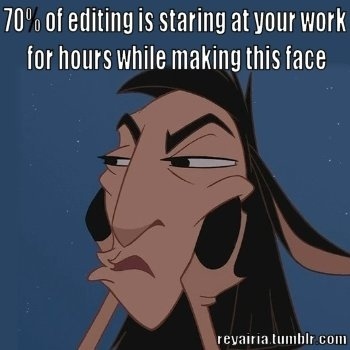
Now, there may not be a magic idea tree in every writer's backyard, but there may actually be a strategy or trick that's so helpful it may as well be magic. At least it has been incredibly helpful for me. This strategy can help at any stage of the brainstorming process--whether we're developing a character, designing our setting, or trying to figure out how to add more tension to a scene. This strategy--this secret weapon--is incongruity.
In other words, put something there that doesn't belong.
At least, something that doesn't seem to belong on the surface. Say you're working on a novel about two college roommates. One is a biology major, the other is going into physical therapy. Say you're in the middle of this novel, and you're stuck on a scene that seems to be falling completely flat. Then imagine the physical therapist finds a dozen Duke Ellington records under the biologists bed. That's something that doesn't appear to belong. That adds interest and intrigue.
Now, say you're developing your characters and setting. Add something to your character or setting that doesn't seem to belong. Here are some examples:


What is a piano doing in the middle of a possibly burnt forest? Aren't you intrigued by the back story of a man with a Mohawk and a Santa suit? These kinds of seeming incongruities are what catch and keep the readers attention. They are little mysteries your reader will keep reading to figure out.
There are entire stories based on and extrapolated from a single incongruity. A human in Santa's workshop? That's the movie Elf. What about a blond high-school beauty queen going to Harvard Law School? Legally Blonde. That one is particularly fun because you get to see a bunch of stereotypes get busted. And perhaps one of my favorites--a meter-high gardener helping to take down a Dark Lord and his entire kingdom? Hello Samwise Gamgee :)
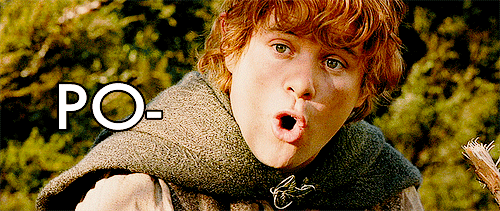
So next time you're trying to brainstorm ideas for your next project, or you're trying to flesh out your next main character, or you're trying to figure your way out of a mucky middle bit, try this simple technique. Try simply adding something that doesn't seem to belong, and see where that takes you. You may discover something delightful. Like Will Ferrell in yellow tights.
Write on!
Sarah Allen
This Week on Social Media:
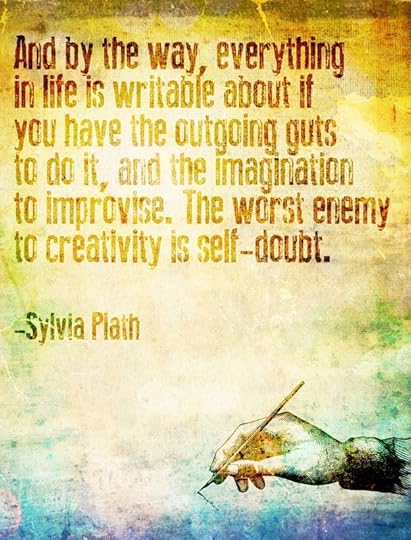
For more frequent updates, writing tips, and funnies, follow on Facebook, Twitter, Google+,
YouTube, Pinterest, Tumblr, GoodReads, and/or Instagram.
SUBMISSION OPPORTUNITIES:
The First Line Magazine: All stories must be written with the first line provided. Due Nov. 1Writers Digest: Your Story 61: Write the opening sentence (just one, of 25 words or fewer) to a story based on a photo given. You can be funny, poignant, witty, etc.; it is, after all, your story. Due Oct. 13.BathHouse Magazine: The international hypermedia journal BathHouse is currently accepting submissions for its 12.1 issue with the underlying theme of "International". Due Nov. 17.Cactus Heart Magazine: Speculative themed issue. We want beautifully written fantasy, science fiction, steampunk, & reimagined fairy tales. Send your character-driven stories & poems full of magic, spaceships, & clockwork gadgets; send stories & poems that play on tropes, & make us reflect on our humanity along with gods, banshees, & cyborgs. Due Jan. 10.Drunken Odyssey Podcast: The Drunken Odyssey, an amazing writing podcast, needs personal essays for its “Book that Changed my Life” segments. Send pitches for essay ideas to thedrunkenodyssey@gmail.com. For approved pitches, essays should be between 500 and 800 words. Ongoing.
SPOTLIGHTS: How To Get it Right on Social Media (Author Culture) 10 Money-Making Tasks Successful Freelancer Writers Do Every Day (The Write Life)10 Book Marketing Mistakes Self-Published Authors Make (BiblioCrunch) Squeezing Out the Stupid (Writer Unboxed)
Not only is it unclear where ideas come from, there seems to be no reliable way to make them come when we need them. If only there were a magic box under every writers bed that popped out the right idea whenever we needed it. If only there were elves that came out at night and finished that scene we've been stuck on. If only there were a tree that dropped idea apples every day at 5:47. Then we'd have an easy answer.
But, unfortunately, none of these things are actually available. The reality is much more of a slog. Whether we're trying to brainstorm an idea for a new novel, or we're stuck in the middle of our WIP and need an idea to get it moving forward, writers spend lots of time glaring at computer screens.

Now, there may not be a magic idea tree in every writer's backyard, but there may actually be a strategy or trick that's so helpful it may as well be magic. At least it has been incredibly helpful for me. This strategy can help at any stage of the brainstorming process--whether we're developing a character, designing our setting, or trying to figure out how to add more tension to a scene. This strategy--this secret weapon--is incongruity.
In other words, put something there that doesn't belong.
At least, something that doesn't seem to belong on the surface. Say you're working on a novel about two college roommates. One is a biology major, the other is going into physical therapy. Say you're in the middle of this novel, and you're stuck on a scene that seems to be falling completely flat. Then imagine the physical therapist finds a dozen Duke Ellington records under the biologists bed. That's something that doesn't appear to belong. That adds interest and intrigue.
Now, say you're developing your characters and setting. Add something to your character or setting that doesn't seem to belong. Here are some examples:


What is a piano doing in the middle of a possibly burnt forest? Aren't you intrigued by the back story of a man with a Mohawk and a Santa suit? These kinds of seeming incongruities are what catch and keep the readers attention. They are little mysteries your reader will keep reading to figure out.
There are entire stories based on and extrapolated from a single incongruity. A human in Santa's workshop? That's the movie Elf. What about a blond high-school beauty queen going to Harvard Law School? Legally Blonde. That one is particularly fun because you get to see a bunch of stereotypes get busted. And perhaps one of my favorites--a meter-high gardener helping to take down a Dark Lord and his entire kingdom? Hello Samwise Gamgee :)

So next time you're trying to brainstorm ideas for your next project, or you're trying to flesh out your next main character, or you're trying to figure your way out of a mucky middle bit, try this simple technique. Try simply adding something that doesn't seem to belong, and see where that takes you. You may discover something delightful. Like Will Ferrell in yellow tights.
Write on!
Sarah Allen
This Week on Social Media:

For more frequent updates, writing tips, and funnies, follow on Facebook, Twitter, Google+,
YouTube, Pinterest, Tumblr, GoodReads, and/or Instagram.
SUBMISSION OPPORTUNITIES:
The First Line Magazine: All stories must be written with the first line provided. Due Nov. 1Writers Digest: Your Story 61: Write the opening sentence (just one, of 25 words or fewer) to a story based on a photo given. You can be funny, poignant, witty, etc.; it is, after all, your story. Due Oct. 13.BathHouse Magazine: The international hypermedia journal BathHouse is currently accepting submissions for its 12.1 issue with the underlying theme of "International". Due Nov. 17.Cactus Heart Magazine: Speculative themed issue. We want beautifully written fantasy, science fiction, steampunk, & reimagined fairy tales. Send your character-driven stories & poems full of magic, spaceships, & clockwork gadgets; send stories & poems that play on tropes, & make us reflect on our humanity along with gods, banshees, & cyborgs. Due Jan. 10.Drunken Odyssey Podcast: The Drunken Odyssey, an amazing writing podcast, needs personal essays for its “Book that Changed my Life” segments. Send pitches for essay ideas to thedrunkenodyssey@gmail.com. For approved pitches, essays should be between 500 and 800 words. Ongoing.
SPOTLIGHTS: How To Get it Right on Social Media (Author Culture) 10 Money-Making Tasks Successful Freelancer Writers Do Every Day (The Write Life)10 Book Marketing Mistakes Self-Published Authors Make (BiblioCrunch) Squeezing Out the Stupid (Writer Unboxed)
Published on September 29, 2014 04:00
September 25, 2014
Ayn Rand Is My Nemesis
 So I've known for a while that I don't particularly like Ayn Rand.
So I've known for a while that I don't particularly like Ayn Rand.Then yesterday I read Anthem.
It's a bit of a long story why I ended up reading it, but suffice it to say my roommate and I read it simultaneously yesterday afternoon on Project Gutenberg. It's very short (thank goodness...how do people suffer through Atlas Shrugged or The Fountainhead?) and easily readable in an afternoon.
To be totally honest, I had so many problems with it I'm not quite sure where to even start. My roommate and I kept up a running commentary on Google chat, so maybe I'll just start with that. And believe me, I will do my best to be civil. (And to that end we won't even talk about the writing style...or the dialog...)
Probably the main crux of my problem with this book is that Rand sets up a false dichotomy from the very beginning. One of the rules in this dystopic community she's set up is that "If you are not needed by your brother man, there is no reason for you to burden the earth with your bodies." She sets this rule up as sort of an "evil" to be fought, which in contrast sets up the "correct" rule that taking care of ones own needs is primary and serving others is secondary, if not pointless. Let's keep going before we address this, because she just keeps making this point more and more strongly.
When the main character meets a beautiful girl, they decide to give each other individual names. He calls her The Golden One (which is also problematic, and we'll talk about it later) and she calls him The Unconquered. Again, Rand is setting up this dichotomy that because Main Character is thinking about himself rather than some sort of collective, he is free and "unconquered."
This idea of the main character as "Superior Enlightened Individual" is further strengthened when he attempts to offer up his newly discovered power of electricity. The community "brethren" are frightened and shocked at his stepping outside the collective knowledge, refuse his offering, and Main Character is basically sentenced to death. The way this interchange is described, with the Main Character talking about discovering and offering "the power of the skies," frames the Main Character as vastly superior and everyone else as very unfortunate, dim-witted, and brainwashed.
Once Main Character and Golden One have escaped into the forest and discovered the word "I," the main character says, "Neither am I the means to any end others may wish to accomplish. I am not a tool for their use. I am not a servant of their needs. I am not a bandage for their wounds. I am not a sacrifice on their altars."
Do you see the point Ayn Rand is trying to make? She's not exactly subtle. She is again and again saying that all is in service of the Self, that even considering the needs of others is of last priority, if it makes the list at all. Main Character says of their newly discovered house and life: "We shall not share it with others, as we share not our joy with them, nor our love, nor our hunger. So be it to the end of our days."
Sorry, but...can I go throw up now? Doesn't this character sound like such a nice guy? And to make it even better, after he says this, the only response from Trophy Wife is "Your will be done." (Told you she was problematic. We're not super focused on complex female characters who are there to do anything other than serve the needs of the Man in this book...) Okay sorry, back to attempting civility...
I see the dichotomy that Rand sets up of "I vs. We" as a false one and here's why: Can't we be a means to an end for someone else without existing only as a means to an end for someone else? Can't we be useful to someone without being a tool? Can't we serve without being a servant, comfort without being a bandage, sacrifice without being a sacrifice?
And I'll take it another step further. Not only do we absolutely not give up any individual identity in the service and care of others, but I firmly believe that in many ways we discover and develop that identity through that service. I feel like it's a core, foundational belief for me that he who loses his life in the service of others will find it. And there are lots of scientific studies that back that up. And amazing, amazing TED Talks about how focusing so strongly on our own goals and desires and needs can actually be the very thing that makes us unhappy.
Now, contrast the point Ayn Rand is making in Anthem with this quote:
It is a serious thing to live in a society of possible gods and goddesses, to remember that the dullest most uninteresting person you talk to may one day be a creature which,if you saw it now, you would be strongly tempted to worship, or else a horror and a corruption such as you now meet, if at all, only in a nightmare. All day long we are, in some degree helping each other to one or the other of these destinations. It is in the light of these overwhelming possibilities, it is with the awe and the circumspection proper to them, that we should conduct all of our dealings with one another, all friendships, all loves, all play, all politics. There are no ordinary people. You have never talked to a mere mortal.Yeah, that's my good buddy C. S. Lewis, and I kept thinking of this quote while I was reading Anthem. Roommate and I use the term "Special Snowflake" occasionally as a shorthand for characters that think they're somehow set apart, or superior, or "special." We definitely used it to refer to the Main Character of Anthem. But really nobody is a "special snowflake" because everyone is.
Really though, which of these two societies is more true to your experience? I don't mean this in a what feels the nicest and happiest kind of way, but actual lived experience. I know we all have days when we feel like we're surrounded by idiots, but I absolutely do not believe for a second that I live in a world where I am not obligated to care about anyone else, and that the most deserving and enlightened are a select group of "special snowflakes." But I do live in a world where everyone I see is complex and nuanced and just as intricate as I am.
I don't believe in ordinary people.
I am not "conquered" by serving and helping others and sometimes putting their needs above my own; in fact to use Michelangelo's metaphor, I believe that those moments of altruism (Rand's least favorite word) are exactly what chip away at the marble and expose the true shape within. We become more ourselves, not less, when united with others.
I know this is a bit long and philosophical and rambly, but what do you think? Do you agree with Ayn Rand? Do you have an ideological nemesis?
Write on!
Sarah Allen
For more updates, writing tips, and funnies, sign up for the monthly newsletter and get a free copy of 50 Marketing and Networking Tips for Writers!
Published on September 25, 2014 05:00
September 22, 2014
4 Great Lessons for Writers from Ron Swanson
So my roommate and I just finished catching up on Parks and Rec.

I didn't expect to ever find a show with quite that perfect mixture of sweet and awkward and real and poignant that The Office had, but let me tell you, Parks and Rec came pretty darn close.
As with The Office, this show is all about character. We care about these shows not for the ridiculous and quirky plots, but because the characters are so absolutely engaging. Each character seems to be perfectly balanced between very grounded and recognizable as well as over-the-top quirky and interesting. If we can write characters the way Michael Scott and Leslie Knope were written, we're on a good road.
Perhaps my favorite character (well, one of them...there's just so many good options!) was of course, the oft quoted Ron Swanson. Quick bit of trivia for those who watch the show: did you know that Nick Offerman, who plays Swanson, is actually a carpenter, actually plays the saxaphone, and is actually married in real life to the actress who plays Tammy Two? That just brings me so much weird joy I can hardly stand it.
Anyway. With characters like Ron, we writers could do well to take lessons from both the character and the way he was written. So here are a few lessons I think writers can learn from Ron Swanson:
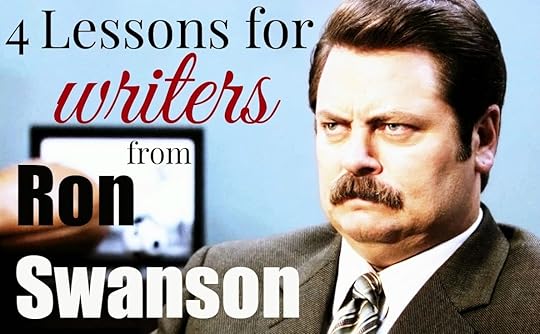
1. We love all-in characters: I think in any storytelling medium, we love over-the-top obsessed characters. Characters who are so into something we start being reminded of that character whenever we encounter their obsession in real life. Parks and Rec has many examples of this type of character quirk. For example, at our post-church "munch-and-mingle" yesterday we had strawberry shortcake with whipped cream and as I lathered on that yummy whipped cream I couldn't help but think of Leslie Knope. As for Ron Swanson, I think of him whenever I have a burger or a steak. Any big hunk of meat on my plate is a good Swanson moment for me. I smile to myself as I remember the utterly devastated look on his face when he sees that his favorite steak place has been boarded up. I really think it just comes down to loving characters who are absolutely passionate, and when its so specific and visceral, that's something that is very easy to connect with.
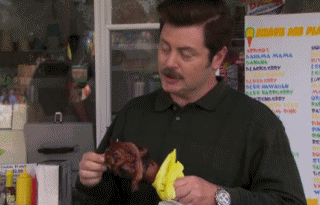
2. Your readers will have possibly surprising interests: The Ron Swanson we initially get to know is a burly, mustachioed, meat-loving, wood-carving lug of a man. His interest in meat and woodcarving seems to hit the nail right on the head. Of course someone like him would love meat and chopping down trees. Of course he could finish off an entire office building floor by himself in less time than it would take the entire reconstruction crew.
But then we are introduced to something surprising--Duke Silver, Swanson's swoon-causing saxophone playing alter-ego. This is a more covert but still solid part of Ron's identity. It will be the same with our readers. Writers are often told to focus on the clear interests of your ideal reader, and that is great advice. Approaching Ron Swanson via his interest in meat or carpentry is a good plan. But we might do well to keep in mind that the other, perhaps less obvious interests we may have, may be shared by people who would fit well in our readership. We can use these interests as social media and blog topics, or article ideas, or in a myriad of other ways.
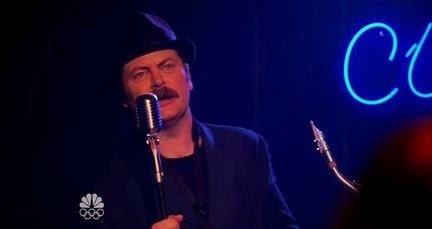
3. Not all your readers will be on the grid: Anybody remember the episode when Ron finds out that advertising companies have some of his information, and he chucks his whole computer in the dumpster? Now that's an extreme example, but there are plenty of people who are best approached somewhere other than cyberspace. Perhaps there is a reader out there ideal for your particular book who gets most of her recommendations and info from friends or newspapers or magazines. We don't often think of those venues in our instant-info-internet era, but they are still very much there, and very valuable. This is why I think it wise for any writer, regardless the genre of your books, to pitch articles to various magazines and submit short stories and poetry to magazines and anthologies. There is still something very powerful about the printed page, and these venues provide a way to reach readers we may not have otherwise.

4. We love the soft side: One reason I love Ron Swanson so much is that my favorite characters are the ones with a gruff exterior who very rarely reveal their softer side. It just makes me squee with delight, and I'm pretty sure I'm not the only one. Our hearts are warmed when Ron hints in the best way he knows how the way he truly feels about Leslie. We love when Ron gets embarrassed or even slightly emotional. These show the human side of these types of characters and take them past entertaining into relatable.

I hope this gives you some good ideas and inspiration. What do you think? Can you think of any other lessons we writers can take from the Swanson?
Write on!
Sarah Allen
This Week on Social Media:

For more frequent updates, writing tips, and funnies, follow on Facebook, Twitter, Google+,
YouTube, Pinterest, Tumblr, GoodReads, and/or Instagram.
SUBMISSION OPPORTUNITIES:
Blue Mountain Arts: Blue Mountain Arts is interested in reviewing writings that would be appropriate for publication on our greeting cards. We are looking for highly original and creative submissions on love, friendship, family, philosophies, and any other topic that one person might want to share with another. Please note that we do not accept rhyming poetry. Ongoing.The Rain, Party, & Disaster Society: The Rain, Part, & Disaster society anthology is seeking poetry, non-fiction essays, and flash fiction that tackles their October theme: The End. Send your work that thematically, literally, or figuratively includes concepts of endings or the end of something. Due Oct. 15.Coe Review: The Coe Review is a magazine that unleashes refreshing perspectives and unheard voices. We accept all forms of poetry for our fall issue, and, from our hundreds of submissions, we choose those with original forms, styles, messages, and origins. Due Oct. 25.Dark Matter: Dark Matter publishes literary speculative poetry, flash fiction, short fiction, essays, and musings. We are interested in all things speculative in literature. We are not interested in anything dogmatic or mystical. Use natural metaphor to explore meaning and challenge traditional wisdom. Due Dec. 1SPOTLIGHTS: 10 Things That Red-Flag a Newbie Novelist (Anne R. Allen) 10 Things To Never Say to a Writer (Chuck Wendig at Terribleminds) One Great Way To Write A Short Story (Author Culture)How To Write a Story With Deep Structure (And Win A Prize For It) (Write to Done) 8 Simple Tweaks That Will Skyrocket Your Blogs Traffic (Michael Hyatt)

I didn't expect to ever find a show with quite that perfect mixture of sweet and awkward and real and poignant that The Office had, but let me tell you, Parks and Rec came pretty darn close.
As with The Office, this show is all about character. We care about these shows not for the ridiculous and quirky plots, but because the characters are so absolutely engaging. Each character seems to be perfectly balanced between very grounded and recognizable as well as over-the-top quirky and interesting. If we can write characters the way Michael Scott and Leslie Knope were written, we're on a good road.
Perhaps my favorite character (well, one of them...there's just so many good options!) was of course, the oft quoted Ron Swanson. Quick bit of trivia for those who watch the show: did you know that Nick Offerman, who plays Swanson, is actually a carpenter, actually plays the saxaphone, and is actually married in real life to the actress who plays Tammy Two? That just brings me so much weird joy I can hardly stand it.
Anyway. With characters like Ron, we writers could do well to take lessons from both the character and the way he was written. So here are a few lessons I think writers can learn from Ron Swanson:

1. We love all-in characters: I think in any storytelling medium, we love over-the-top obsessed characters. Characters who are so into something we start being reminded of that character whenever we encounter their obsession in real life. Parks and Rec has many examples of this type of character quirk. For example, at our post-church "munch-and-mingle" yesterday we had strawberry shortcake with whipped cream and as I lathered on that yummy whipped cream I couldn't help but think of Leslie Knope. As for Ron Swanson, I think of him whenever I have a burger or a steak. Any big hunk of meat on my plate is a good Swanson moment for me. I smile to myself as I remember the utterly devastated look on his face when he sees that his favorite steak place has been boarded up. I really think it just comes down to loving characters who are absolutely passionate, and when its so specific and visceral, that's something that is very easy to connect with.

2. Your readers will have possibly surprising interests: The Ron Swanson we initially get to know is a burly, mustachioed, meat-loving, wood-carving lug of a man. His interest in meat and woodcarving seems to hit the nail right on the head. Of course someone like him would love meat and chopping down trees. Of course he could finish off an entire office building floor by himself in less time than it would take the entire reconstruction crew.
But then we are introduced to something surprising--Duke Silver, Swanson's swoon-causing saxophone playing alter-ego. This is a more covert but still solid part of Ron's identity. It will be the same with our readers. Writers are often told to focus on the clear interests of your ideal reader, and that is great advice. Approaching Ron Swanson via his interest in meat or carpentry is a good plan. But we might do well to keep in mind that the other, perhaps less obvious interests we may have, may be shared by people who would fit well in our readership. We can use these interests as social media and blog topics, or article ideas, or in a myriad of other ways.

3. Not all your readers will be on the grid: Anybody remember the episode when Ron finds out that advertising companies have some of his information, and he chucks his whole computer in the dumpster? Now that's an extreme example, but there are plenty of people who are best approached somewhere other than cyberspace. Perhaps there is a reader out there ideal for your particular book who gets most of her recommendations and info from friends or newspapers or magazines. We don't often think of those venues in our instant-info-internet era, but they are still very much there, and very valuable. This is why I think it wise for any writer, regardless the genre of your books, to pitch articles to various magazines and submit short stories and poetry to magazines and anthologies. There is still something very powerful about the printed page, and these venues provide a way to reach readers we may not have otherwise.

4. We love the soft side: One reason I love Ron Swanson so much is that my favorite characters are the ones with a gruff exterior who very rarely reveal their softer side. It just makes me squee with delight, and I'm pretty sure I'm not the only one. Our hearts are warmed when Ron hints in the best way he knows how the way he truly feels about Leslie. We love when Ron gets embarrassed or even slightly emotional. These show the human side of these types of characters and take them past entertaining into relatable.

I hope this gives you some good ideas and inspiration. What do you think? Can you think of any other lessons we writers can take from the Swanson?
Write on!
Sarah Allen
This Week on Social Media:

For more frequent updates, writing tips, and funnies, follow on Facebook, Twitter, Google+,
YouTube, Pinterest, Tumblr, GoodReads, and/or Instagram.
SUBMISSION OPPORTUNITIES:
Blue Mountain Arts: Blue Mountain Arts is interested in reviewing writings that would be appropriate for publication on our greeting cards. We are looking for highly original and creative submissions on love, friendship, family, philosophies, and any other topic that one person might want to share with another. Please note that we do not accept rhyming poetry. Ongoing.The Rain, Party, & Disaster Society: The Rain, Part, & Disaster society anthology is seeking poetry, non-fiction essays, and flash fiction that tackles their October theme: The End. Send your work that thematically, literally, or figuratively includes concepts of endings or the end of something. Due Oct. 15.Coe Review: The Coe Review is a magazine that unleashes refreshing perspectives and unheard voices. We accept all forms of poetry for our fall issue, and, from our hundreds of submissions, we choose those with original forms, styles, messages, and origins. Due Oct. 25.Dark Matter: Dark Matter publishes literary speculative poetry, flash fiction, short fiction, essays, and musings. We are interested in all things speculative in literature. We are not interested in anything dogmatic or mystical. Use natural metaphor to explore meaning and challenge traditional wisdom. Due Dec. 1SPOTLIGHTS: 10 Things That Red-Flag a Newbie Novelist (Anne R. Allen) 10 Things To Never Say to a Writer (Chuck Wendig at Terribleminds) One Great Way To Write A Short Story (Author Culture)How To Write a Story With Deep Structure (And Win A Prize For It) (Write to Done) 8 Simple Tweaks That Will Skyrocket Your Blogs Traffic (Michael Hyatt)
Published on September 22, 2014 05:00



